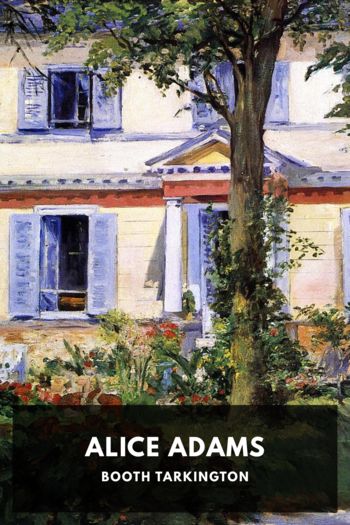The Turmoil - Booth Tarkington (good books to read for 12 year olds .txt) 📗

- Author: Booth Tarkington
Book online «The Turmoil - Booth Tarkington (good books to read for 12 year olds .txt) 📗». Author Booth Tarkington
Bibbs began to think intently of his father. He perceived, as he had never perceived before, the shadowing of something enormous and indomitable—and lawless; not to be daunted by the will of nature’s very self; laughing at the lightning and at wounds and mutilation; conquering, irresistible—and blindly noble. For the first time in his life Bibbs began to understand the meaning of being truly this man’s son.
He would be the more truly his son henceforth, though, as Sheridan said, Bibbs had not come downtown with him meanly or half-heartedly. He had given his word because he had wanted the money, simply, for Mary Vertrees in her need. And he shivered with horror of himself, thinking how he had gone to her to offer it, asking her to marry him—with his head on his breast in shameful fear that she would accept him! He had not known her; the knowing had lost her to him, and this had been his real awakening; for he knew now how deep had been that slumber wherein he dreamily celebrated the superiority of “friendship”! The sleepwalker had wakened to bitter knowledge of love and life, finding himself a failure in both. He had made a burnt offering of his dreams, and the sacrifice had been an unforgivable hurt to Mary. All that was left for him was the work he had not chosen, but at least he would not fail in that, though it was indeed no more than dust in his mouth. If there had been anything to work for—
He went to the window, raised it, and let in the uproar of the streets below. He looked down at the blurred, hurrying swarms and he looked across, over the roofs with their panting jets of vapor, into the vast, foggy heart of the smoke. Dizzy traceries of steel were rising dimly against it, chattering with steel on steel, and screeching in steam, while tiny figures of men walked on threads in the dull sky. Buildings would overtop the Sheridan. Bigness was being served.
But what for? The old question came to Bibbs with a new despair. Here, where his eyes fell, had once been green fields and running brooks, and how had the kind earth been despoiled and disfigured! The pioneers had begun the work, but in their old age their orators had said for them that they had toiled and risked and sacrificed that their posterity might live in peace and wisdom, enjoying the fruits of the earth. Well, their posterity was here—and there was only turmoil. Where was the promised land? It had been promised by the soldiers of all the wars; it had been promised to this generation by the pioneers; but here was the very posterity to whom it had been promised, toiling and risking and sacrificing in turn—for what?
The harsh roar of the city came in through the open window, continuously beating upon Bibbs’s ear until he began to distinguish a pulsation in it—a broken and irregular cadence. It seemed to him that it was like a titanic voice, discordant, hoarse, rustily metallic—the voice of the god, Bigness. And the voice summoned Bibbs as it summoned all its servants.
“Come and work!” it seemed to yell. “Come and work for Me, all men! By your youth and your hope I summon you! By your age and your despair I summon you to work for Me yet a little, with what strength you have. By your love of home I summon you! By your love of woman I summon you! By your hope of children I summon you!
“You shall be blind slaves of Mine, blind to everything but Me, your Master and Driver! For your reward you shall gaze only upon my ugliness. You shall give your toil and your lives, you shall go mad for love and worship of my ugliness! You shall perish still worshipping Me, and your children shall perish knowing no other god!”
And then, as Bibbs closed the window down tight, he heard his father’s voice booming in the next room; he could not distinguish the words but the tone was exultant—and there came the thump! thump! of the maimed hand. Bibbs guessed that Sheridan was bragging of the city and of Bigness to some visitor from out-of-town.
And he thought how truly Sheridan was the high priest of Bigness. But with the old, old thought again, “What for?” Bibbs caught a glimmer of far, faint light. He saw that Sheridan had all his life struggled and conquered, and must all his life go on struggling and inevitably conquering, as part of a vast impulse not his own. Sheridan served blindly—but was the impulse blind? Bibbs asked himself if it was not he who had been in the greater hurry, after all. The kiln must be fired before the vase is glazed, and the Acropolis was not crowned with marble in a day.
Then the voice came to him again, but there was a strain in it as of some high music struggling to be born of the turmoil. “Ugly I am,” it seemed to say to him, “but never forget that I am a god!” And the voice grew in sonorousness and in dignity. “The highest should serve, but so long as you worship me for my own sake I will not serve you. It is man who makes me ugly, by his worship of me. If man would let me serve him, I should be beautiful!”
Looking once more from the window, Bibbs sculptured for himself—in the vague contortions of the smoke and fog above the roofs—a gigantic figure with feet pedestaled upon the great buildings and shoulders disappearing in the clouds,





Comments (0)